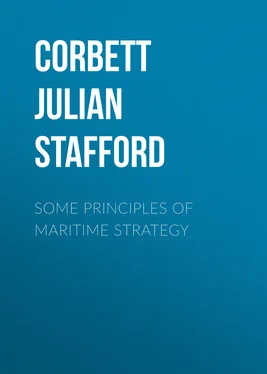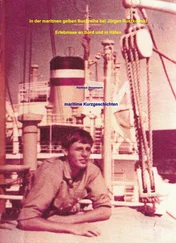Julian Corbett - Some Principles of Maritime Strategy
Здесь есть возможность читать онлайн «Julian Corbett - Some Principles of Maritime Strategy» — ознакомительный отрывок электронной книги совершенно бесплатно, а после прочтения отрывка купить полную версию. В некоторых случаях можно слушать аудио, скачать через торрент в формате fb2 и присутствует краткое содержание. Жанр: military_special, Прочая научная литература, История, foreign_edu, на английском языке. Описание произведения, (предисловие) а так же отзывы посетителей доступны на портале библиотеки ЛибКат.
- Название:Some Principles of Maritime Strategy
- Автор:
- Жанр:
- Год:неизвестен
- ISBN:нет данных
- Рейтинг книги:5 / 5. Голосов: 1
-
Избранное:Добавить в избранное
- Отзывы:
-
Ваша оценка:
- 100
- 1
- 2
- 3
- 4
- 5
Some Principles of Maritime Strategy: краткое содержание, описание и аннотация
Предлагаем к чтению аннотацию, описание, краткое содержание или предисловие (зависит от того, что написал сам автор книги «Some Principles of Maritime Strategy»). Если вы не нашли необходимую информацию о книге — напишите в комментариях, мы постараемся отыскать её.
Some Principles of Maritime Strategy — читать онлайн ознакомительный отрывок
Ниже представлен текст книги, разбитый по страницам. Система сохранения места последней прочитанной страницы, позволяет с удобством читать онлайн бесплатно книгу «Some Principles of Maritime Strategy», без необходимости каждый раз заново искать на чём Вы остановились. Поставьте закладку, и сможете в любой момент перейти на страницу, на которой закончили чтение.
Интервал:
Закладка:
Clear and well proven as these considerations are for land warfare, their application to the sea is not so obvious. It will be objected that at sea there is no defensive. This is generally true for tactics, but even so not universally true. Defensive tactical positions are possible at sea, as in defended anchorages. These were always a reality, and the mine has increased their possibilities. In the latest developments of naval warfare we have seen the Japanese at the Elliot Islands preparing a real defensive position to cover the landing of their Second Army in the Liaotung Peninsula. Strategically the proposition is not true at all. A strategical defensive has been quite as common at sea as on land, and our own gravest problems have often been how to break down such an attitude when our enemy assumed it. It usually meant that the enemy remained in his own waters and near his own bases, where it was almost impossible for us to attack him with decisive result, and whence he always threatened us with counterattack at moments of exhaustion, as the Dutch did at Sole Bay and in the Medway. The difficulty of dealing decisively with an enemy who adopted this course was realised by our service very early, and from first to last one of our chief preoccupations was to prevent the enemy availing himself of this device and to force him to fight in the open, or at least to get between him and his base and force an action there.
Probably the most remarkable manifestation of the advantages that may be derived in suitable conditions from a strategical defensive is also to be found in the late Russo-Japanese War. In the final crisis of the naval struggle the Japanese fleet was able to take advantage of a defensive attitude in its own waters which the Russian Baltic fleet would have to break down to attain its end, and the result was the most decisive naval victory ever recorded.
The deterrent power of active and dexterous operations from such a position was well known to our old tradition. The device was used several times, particularly in our home waters, to prevent a fleet, which for the time we were locally too weak to destroy, from carrying out the work assigned to it. A typical position of the kind was off Scilly, and it was proved again and again that even a superior fleet could not hope to effect anything in the Channel till the fleet off Scilly had been brought to decisive action. But the essence of the device was the preservation of the aggressive spirit in its most daring form. For success it depended on at least the will to seize every occasion for bold and harassing counter-attacks such as Drake and his colleagues struck at the Armada.
To submit to blockade in order to engage the attention of a superior enemy's fleet is another form of defensive, but one that is almost wholly evil. For a short time it may do good by permitting offensive operations elsewhere which otherwise would be impossible. But if prolonged, it will sooner or later destroy the spirit of your force and render it incapable of effective aggression.
The conclusion then is that although for the practical purpose of framing or appreciating plans of war the classification of wars into offensive and defensive is of little use, a clear apprehension of the inherent relative advantages of offence and defence is essential. We must realise that in certain cases, provided always we preserve the aggressive spirit, the defensive will enable an inferior force to achieve points when the offensive would probably lead to its destruction. But the elements of strength depend entirely on the will and insight to deal rapid blows in the enemy's unguarded moments. So soon as the defensive ceases to be regarded as a means of fostering power to strike and of reducing the enemy's power of attack it loses all its strength. It ceases to be even a suspended activity, and anything that is not activity is not war.
With these general indications of the relative advantages of offence and defence we may leave the subject for the present. It is possible of course to catalogue the advantages and disadvantages of each form, but any such bald statement—without concrete examples to explain the meaning—must always appear controversial and is apt to mislead. It is better to reserve their fuller consideration till we come to deal with strategical operations and are able to note their actual effect upon the conduct of war in its various forms. Leaving therefore our first classification of wars into offensive and defensive we will pass on to the second, which is the only one of real practical importance.
CHAPTER THREE
NATURES OF WARS— LIMITED AND UNLIMITED
The second classification to which we are led by the political theory of war, is one which Clausewitz was the first to formulate and one to which he came to attach the highest importance. It becomes necessary therefore to examine his views in some detail—not because there is any need to regard a continental soldier, however distinguished, as an indispensable authority for a maritime nation. The reason is quite the reverse. It is because a careful examination of his doctrine on this point will lay open what are the radical and essential differences between the German or Continental School of Strategy and the British or Maritime School—that is, our own traditional School, which too many writers both at home and abroad quietly assume to have no existence. The evil tendency of that assumption cannot be too strongly emphasised, and the main purpose of this and the following chapters will be to show how and why even the greatest of the continental strategists fell short of realising fully the characteristic conception of the British tradition.
By the classification in question Clausewitz distinguished wars into those with a "Limited" object and those whose object was "Unlimited." Such a classification was entirely characteristic of him, for it rested not alone upon the material nature of the object, but on certain moral considerations to which he was the first to attach their real value in war. Other writers such as Jomini had attempted to classify wars by the special purpose for which they were fought, but Clausewitz's long course of study convinced him that such a distinction was unphilosophical and bore no just relation to any tenable theory of war. Whether, that is, a war was positive or negative mattered much, but its special purpose, whether, for instance, according to Jomini's system, it was a war "to assert rights" or "to assist an ally" or "to acquire territory," mattered not at all.
Whatever the object, the vital and paramount question was the intensity with which the spirit of the nation was absorbed in its attainment. The real point to determine in approaching any war plan was what did the object mean to the two belligerents, what sacrifices would they make for it, what risks were they prepared to run? It was thus he stated his view. "The smaller the sacrifice we demand from our opponent, the smaller presumably will be the means of resistance he will employ, and the smaller his means, the smaller will ours be required to be. Similarly the smaller our political object, the less value shall we set upon it and the more easily we shall be induced to abandon it." Thus the political object of the war, its original motive, will not only determine for both belligerents reciprocally the aim of the force they use, but it will also be the standard of the intensity of the efforts they will make. So he concludes there may be wars of all degrees of importance and energy from a war of extermination down to the use of an army of observation. So also in the naval sphere there may be a life and death struggle for maritime supremacy or hostilities which never rise beyond a blockade.
Such a view of the subject was of course a wide departure from the theory of "Absolute War" on which Clausewitz had started working. Under that theory "Absolute War" was the ideal form to which all war ought to attain, and those which fell short of it were imperfect wars cramped by a lack of true military spirit. But so soon as he had seized the fact that in actual life the moral factor always must override the purely military factor, he saw that he had been working on too narrow a basis—a basis that was purely theoretical in that it ignored the human factor. He began to perceive that it was logically unsound to assume as the foundation of a strategical system that there was one pattern to which all wars ought to conform. In the light of his full and final apprehension of the value of the human factor he saw wars falling into two well-marked categories, each of which would legitimately be approached in a radically different manner, and not necessarily on the lines of "Absolute War."
Читать дальшеИнтервал:
Закладка:
Похожие книги на «Some Principles of Maritime Strategy»
Представляем Вашему вниманию похожие книги на «Some Principles of Maritime Strategy» списком для выбора. Мы отобрали схожую по названию и смыслу литературу в надежде предоставить читателям больше вариантов отыскать новые, интересные, ещё непрочитанные произведения.
Обсуждение, отзывы о книге «Some Principles of Maritime Strategy» и просто собственные мнения читателей. Оставьте ваши комментарии, напишите, что Вы думаете о произведении, его смысле или главных героях. Укажите что конкретно понравилось, а что нет, и почему Вы так считаете.












